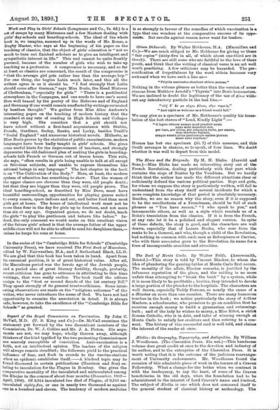(Mum Didascali. By Walter Hobhouse, MA. (Macmillan and Co.)—We are
much obliged to Mr. Hobhouse for giving us these "fair copies" (sixty-five in all, of which about one-third are in Greek). There are still some who are faithful to the love of their youth, and think that the writing of classical verse is an art well worth practising. A few criticisms may be hazarded. The per. sonification of forgetfulness by the word ob/ieia becomes very awkward when we have such a line as- " Frigid& =mantes elaudunt oblivia pennaa."
Nothing in the volume pleases us better than the version of some stanzas from Matthew Arnold's " Thyrsis " into Doric hexameters. We are inclined to doubt the legitimacy of the use of iXos with. out any introductory particle in the last line,— " rbt 8' dr pte /km bun, dye Tapetn,”
And night as weloome as a friend would M."
We may give as a specimen of Mr. Hobhouse's quality his trans- lation of the last stanza of "Lead, Kindly Light" :—
"0 lapsia ntinam unman quod praef nit aunis
mine mihi monatret iter,
per hips, per divas, per inhospita terra, per amnes,
dam tenebrae fngiant, =qua amata twins panllumque amiasa piornm mane novo repetam..
Horace has but one specimen (iii. 7) of this measure, and this Orelli arranges in stanzas, so to speak, of four lines. We doubt whether it was well to depart from this model.


































 Previous page
Previous page